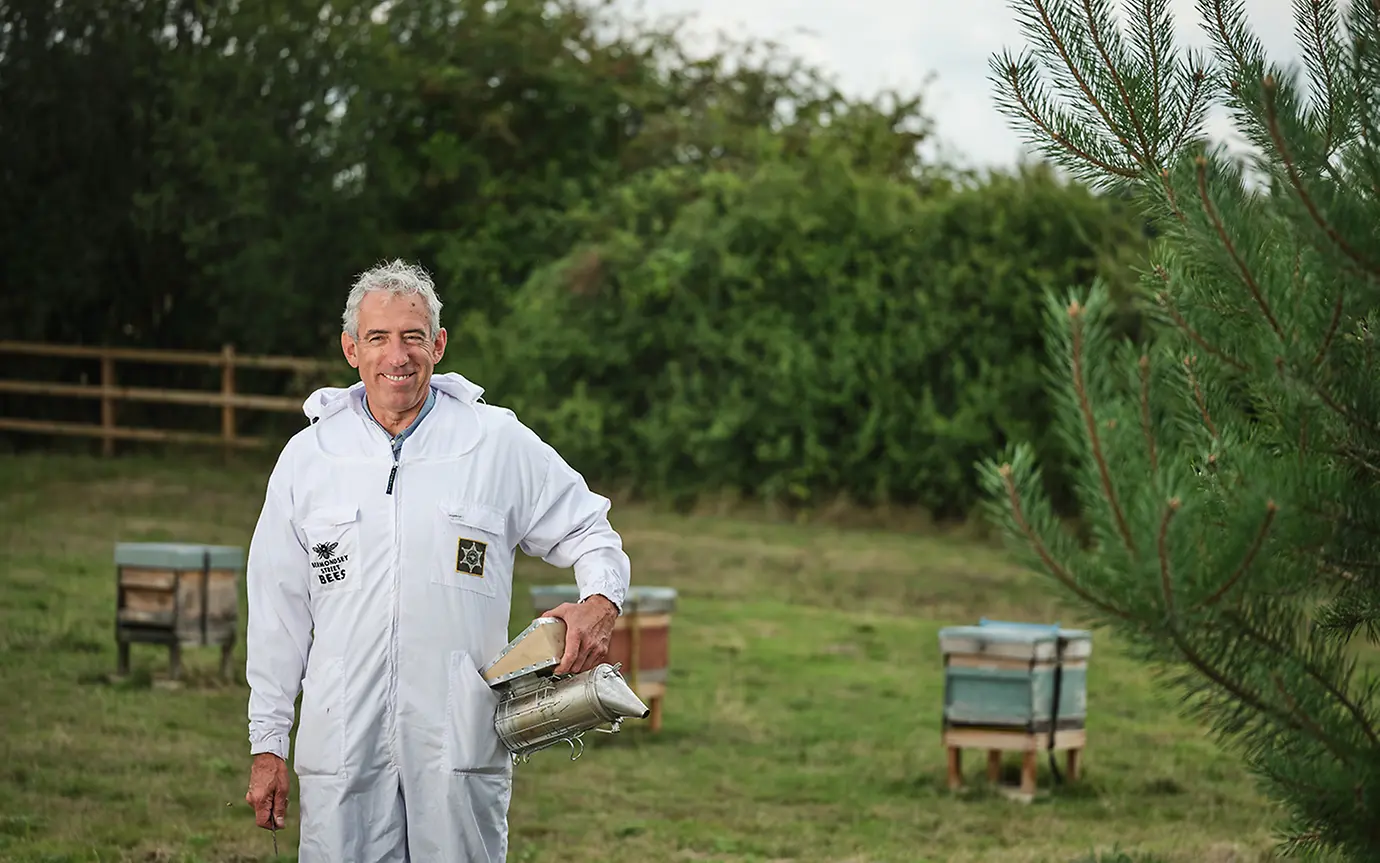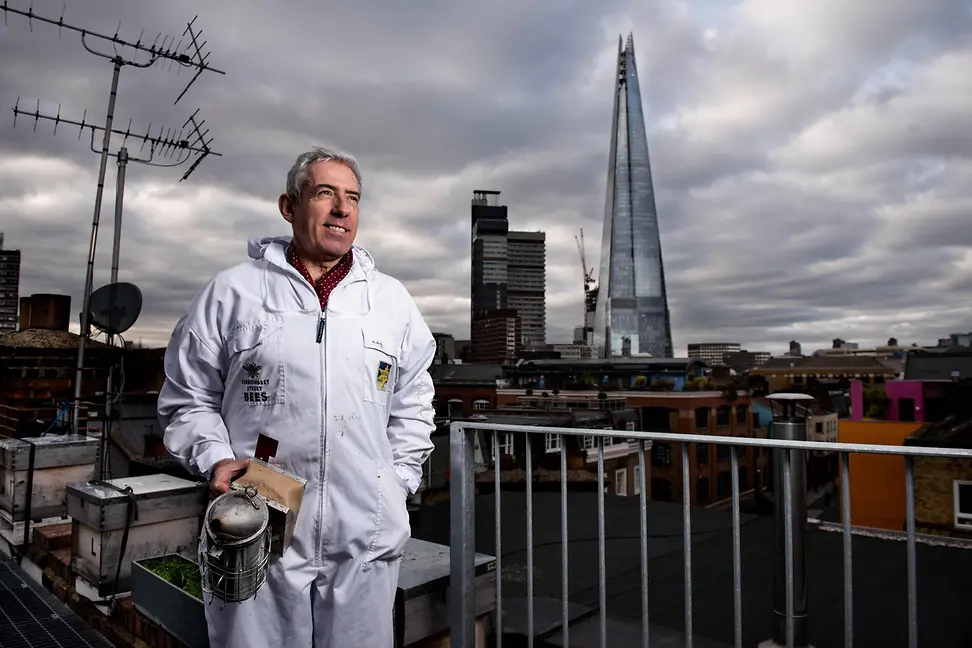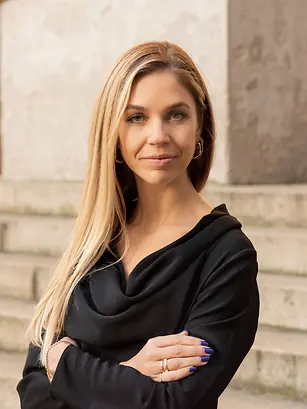
“Since the beginning, honey production has been our last concern. Instead, we’ve prioritised bee welfare, responsible business, and environmental stewardship”, says Sarah, “and many years later, I think we can honestly say that we remain at the leading edge of sustainability in our profession.“
“What’s notable though,“ Sarah adds, “are some tough decisions we’ve had to make to stay on the path of best practice.”
Sarah, a writer, and her husband Dale Gibson, formerly a city stockbroker, established Bermondsey Street Bees in London, on a rooftop overlooking The Shard. This was 2007, when London beekeeping looked like a sustainability gain. Government data showed low hive density and honeybees revelled in the urban heat island.
Dale had trained with Buckingham Palace beekeeper John Chapple, absorbing John’s credo that beekeepers have a moral responsibility to plant extra food resources for hived bees they add to urban landscapes. This is vital both for the honeybees’ welfare and – vitally - to prevent negative impact on co-existing wild bee species; the bumblebees and solitary bees.
Sarah explains, “Over the next decade, we established numerous community gardens and grew our beekeeping business, in large part with corporate clients seeking honeybees for what seemed, at the time, a positive CSR tick. They supported our “Green Offset” program, requiring them to plant locally, or support local greening charities, to offset the impact of the hives they wanted on their city rooftops.”
“Extraordinary times”, recalls Dale. “We planted, built apiaries in urban and rural locations and raised healthy bees. Simultaneously, we were attracting international media attention for our sustainability agenda, winning top food awards and building supply relationships with Michelin-Starred chefs including Tom Aikens, who retained us to design and run the apiary at Soho Farmhouse. Our single-source raw, artisan honeys sold in Selfridges, Harrods, and Fortnum’s. The biggest concern we had was resisting the constant pressure to expand our beekeeping business. To stay true to our sustainability mission, we needed to remain compact and highly adaptative.”
Surprisingly, pretty much everything. Back in 2006, drastic hive losses in North America had fired rumours of global honeybee extinction and these rumours were steadily fanned by the media. A ‘Save the Bees’ mantra surfaced, which drove new waves of often wholly untrained beekeeping. For the next decade, from law firms and banks to schoolchildren and rock stars, everyone was getting beehives, but mostly failing to ensure their welfare.
All of this ignored the fact that despite local ‘blips’, honeybees are not in danger of going extinct. This is for the simple reason that their numbers, (recorded annually by United Nations’ FAOSTAT since the 1960’s) are human-managed, just like chickens or sheep. Rather, it is the thousands of vital wild bee species which we need to focus on saving from extinction.
“Depressingly,” says Sarah “people find them hard to care so much about, because they don’t produce honey.”
London’s hive population continued its irrational growth. Around 2017, it hit a density estimated at three times greater than anywhere else in Europe. And with overcrowded, starved hives, fatal honeybee disease levels inevitably began skyrocketing.
Dale remembers some complex thought processes, “Meticulously detailed hive records are core to sustainable beekeeping. So, we could use a combination of our own data and the Government’s National Bee Unit reports to track the impact of this tidal wave of honeybees. We always kept our central London hives under especially close review, but for many years they were fine, albeit seeing diminishing honey harvests, a primary indicator of concern. On that basis, we moved some vulnerable hives, including, sadly, our most highly awarded honey producers. That hit us hard financially, but it was the right decision for sustainability.”

From 2019 onwards, as London’s bee disease rate rose ever higher, Dale and Sarah took wider ranging action to protect their bees, moving significant numbers away from overcrowded/diseased urban ‘hotspots’. Post-lockdown, they also took the even harder decision to stop selling their honeys in jars. Although profitable, the carbon footprint of packaging and transport had become unacceptably high.
Since choosing to work exclusively in supplying high-end hospitality, Bermondsey Street Bees’ business has grown back even stronger and in a lower-impact form. The relocated hives are thriving in new locations in London’s rewilded far Docklands, Essex and Hertfordshire. Their remaining central London apiaries, although still under constant review, occupy unique locations such as the densely planted 800-year-old gardens of Lambeth Palace.
In 2022, Dale and Sarah took another big step. Following their bees out of London, they now live and work from four acres of coastal Essex. Here they are establishing the large-scale, biodiverse and regenerative system of pollinator plantings, kitchen gardens and wild areas visited by LGT’s Wealth Management team last year.
As Sarah illustrates through the evolution of Bermondsey bees’ business, the area of sustainability is nuanced. From our perspective, we also see the sustainable investment landscape moving through a period of transition.
"We assess the intentionality alongside the overall impact of companies we have exposure to in the portfolios to get as clear a picture as possible of how sustainable a company is, and whether it is the right investment for our clients.”

A long journey in sustainability, but one which is by no means over…
This communication is provided for information purposes only. The information presented herein provides a general update on market conditions and is not intended and should not be construed as an offer, invitation, solicitation or recommendation to buy or sell any specific investment or participate in any investment (or other) strategy. The subject of the communication is not a regulated investment. Past performance is not an indication of future performance and the value of investments and the income derived from them may fluctuate and you may not receive back the amount you originally invest. Although this document has been prepared on the basis of information we believe to be reliable, LGT Wealth Management UK LLP gives no representation or warranty in relation to the accuracy or completeness of the information presented herein. The information presented herein does not provide sufficient information on which to make an informed investment decision. No liability is accepted whatsoever by LGT Wealth Management UK LLP, employees and associated companies for any direct or consequential loss arising from this document.
LGT Wealth Management UK LLP is authorised and regulated by the Financial Conduct Authority in the United Kingdom.